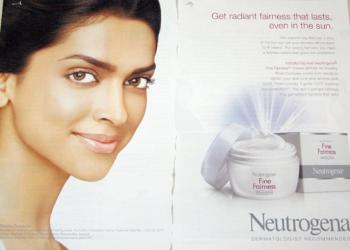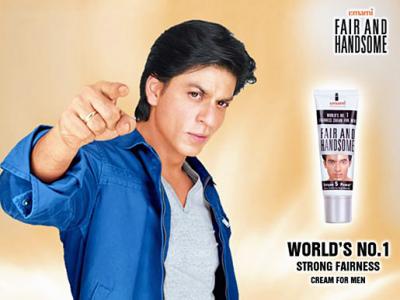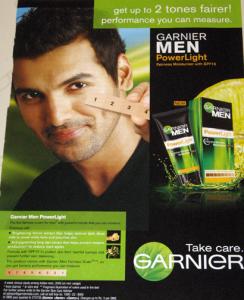| Homepage | RastaTimes | RootsWomen | Trinicenter | RaceandHistory |
| Reasonings | Ayanna's Roots | Ras Tyehimba | Books@Amazon | Articles |
The URL of this page is: www.africaspeaks.com/articles/2010/1006.html India's Popular "Fairness Cream" a Sign of Deep RacismBy Wil Robinson In light of Senator Harry Reid's racist remarks about Obama (get it – in "light" of!), and Rush Limbaugh's overt racist comments about Haiti, I bring you: "Racism: Bollywood Edition." When President Obama was elected, it was hailed in India as a sign of racial equality - as if it were some kind of achievement on a global scale. Indian pundits and writers opined that America had finally crossed the racial barrier the rest of the non-white world already had – and most Indian media implied that this was a non-existent barrier in India (because they aren't white). Oh, how wrong they are. Meet one of India's most popular products: fairness cream.
Really, when you think about it, the idea of putting lotion/cream/powder on your face to make you look white(r) goes beyond even the kind of racism America is dealing with 150 years after the end of slavery, and 30+ years after the end of Jim Crow. Say what you will about American racists – at least they don't have the kind of power and persuasion that would make American people of color try to make themselves white (at least, not overtly).
The advertisements are everywhere – over bus stops, on giant billboards, interspersed throughout mainstream magazines, in stores, on TV...almost everyday I run across some Bollywood celebrity advertising some shit that is supposed to make you pasty. It's shameful. Sickening. And the actors (using that term loosely – if you've ever seen a Shahrukh Khan movie you understand) that endorse these products ought to feel ashamed and beg for the forgiveness of their fellow Indian citizens for insulting them.
The infatuation with light skin can't be blamed on the British. There has always been a connection between skin color and caste in India, though overt displays of the caste system are less pronounced nowadays. In India today, caste usually is manifested more as class. Most upper-caste/class Indians are lighter skinned, and most darker Indians are lower class (though being light-skinned doesn't automatically make one upper-class/caste). Marriage proposals and personal ads consistently request a "fair" bride/groom. Almost all the actors in Bollywood are fair-skinned, and ALL advertisements use only fair-skinned Indians (I've been actively looking for any advertisement over the last 3 days that uses a dark-skinned Indian – who isn't playing the role of someone's servant/assistant/peon – haven't found a single one).
The actresses that get the most attention and enjoy the highest status seem to be those that can look the "whitest." Going strictly by media, one might surmise that India is a country of light-skinned people – but my experience with the 20 million people in Mumbai everyday is that fair-colored Indians are a minority. The worst part is what this social standard does to children. The young teenagers I work with twice a week aren't exactly privileged. They have more than enough factors working against them in life – low income, a piss-poor public education, disease, malaria, malnutrition, stunted growth, some (not all) with abusive/negligent parents, and cultural norms that put the females at a disadvantage. But to top it off, their favorite Bollywood stars are telling them that beauty and success is skin-deep.
One of the girls in the class has said to me more than once that she "likes my skin" because it's "so fair." Another tells me she wants to go to America because "all the people have so fair skin." Comments on the “nice” color of my skin are a regular occurrence (though I always disagree with them, pointing out that in the sun I burn quicker than a piece of toast, and that America is full of people of all colors). A young 14-year-old boy in the class wants to be an actor. Even if he were fair skinned, the chances of being an actor are ridiculously small. But I can't help thinking that if he did get into some Bollywood producer's office, they would only see his dark skin instead of his skills, engaging personality, deep voice, and intelligence.
It isn't just the under-privileged children that have been indoctrinated with an inferiority complex over skin color. After a dinner with three upper-middle class Indians last week, we took a group picture – and I overheard the Indians remarking that "they look black next to us in the photos." So what? Why is that something to feel bad about? America might be faced with serious issues regarding race, but make no mistake – the country offers more things for more different people than any other place in the world. Sen. Reid's comment and Rush Limbaugh's lunacy might be exceptions – but at least they are that – exceptions. There is no decent market for fairness cream in America. Actors, celebrities, and people in advertisements are not limited to a lighter shade of pale. American children can dream of becoming anything they want when they grow up – regardless of skin color – and Obama's election proved that to be true. But if Indian media want to claim President Obama is proof of some kind of global "progress" in race-relations, they better realize one thing: It was America's progress – not anyone else's. And as long as influential Indians continue to endorse fairness cream, telling their fellow citizens that skin color matters, India won't be making any similar progress. Reproduced by consent of the author from: internationalpoliticalwill.com
|




![Indian fairness cream ad [...it's worth noting that none of these products contains SPF protection...]](http://www.africaspeaks.com/bp/neutrogenacream.jpg)
![Indian fairness cream ad [...I like how this one uses the phrase "white perfect"...]](http://www.africaspeaks.com/bp/loreal-perfect.jpg)
